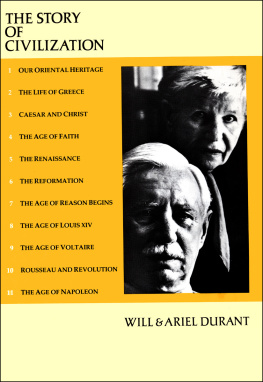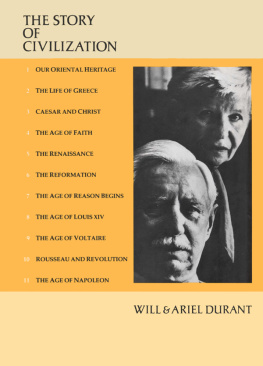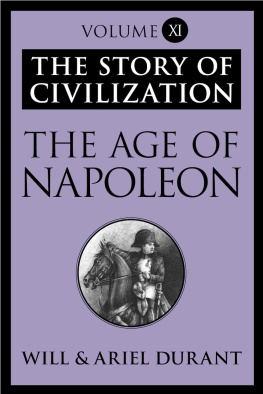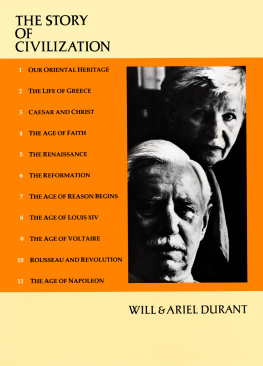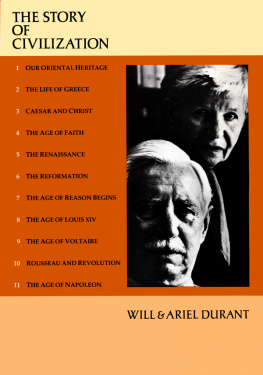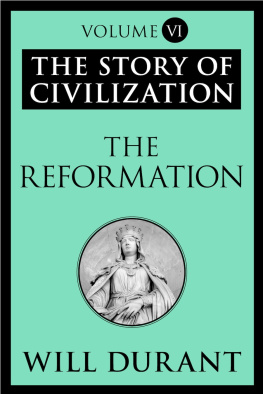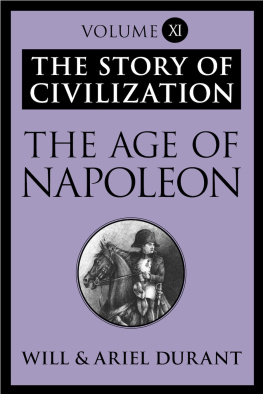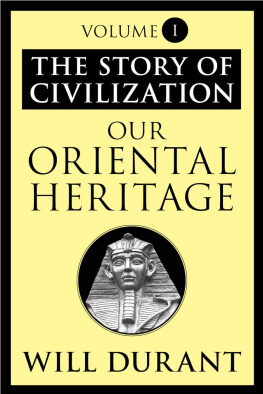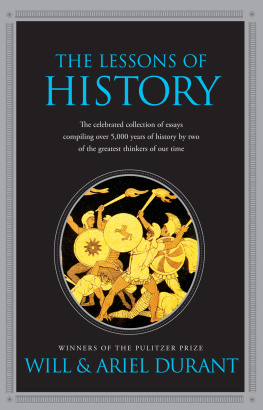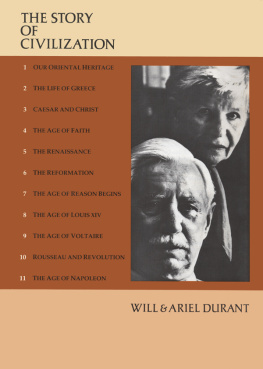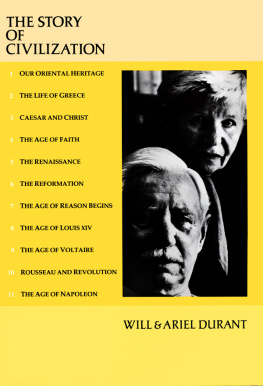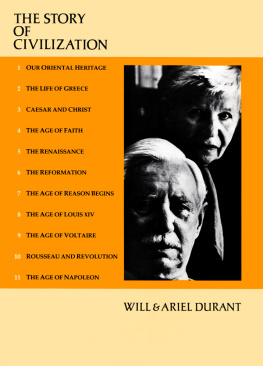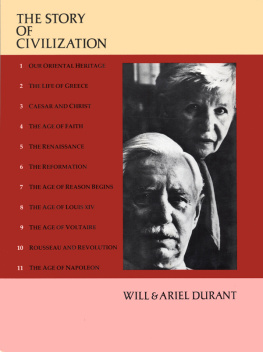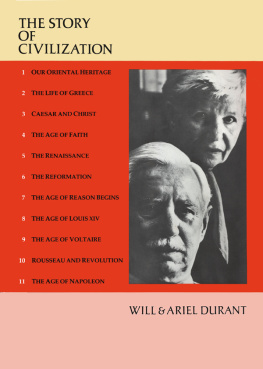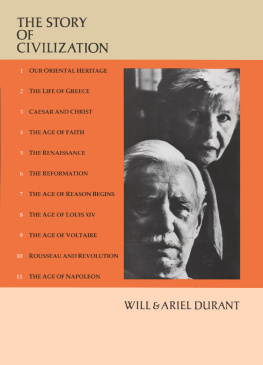Cf. p. 193 below.
The contributions of the Orient to our cultural heritage are summed up in the concluding pages of this volume.
Carter, T. F., The Invention of Printing in China, and Its Spread Westward; New York, 1925, p. xviii.
The reader will find, at the end of this volume, a glossary defining foreign terms, a bibliography with guidance for further reading, a pronouncing index, and a body of references corresponding to the superior figures in the text.
Blood, as distinct from race, may affect a civilization in the sense that a nation may be retarded or advanced by breeding from the biologically (not racially) worse or better strains among the people.
the word civilization will be used in this volume to mean social organization, moral order, and cultural activity; while culture will mean, according to the context, either the practice of manners and the arts, or the sum-total of a peoples institutions, customs and arts. It is in the latter sense that the word culture will be used in reference to primitive or prehistoric societies.
Note the ultimate identity of the words provision, providence and prudence.
Reduced type, unindented, will be used occasionally for technical or dispensable matter.
The American Indians, content with this device, never used the wheel.
Perhaps one reason why communism tends to appear chiefly at the beginning of civilizations is that it flourishes most readily in times of dearth, when the common danger of starvation fuses the individual into the group. When abundance comes, and the danger subsides, social cohesion is lessened, and individualism increases; communism ends where luxury begins. As the life of a society becomes more complex, and the division of labor differentiates men into diverse occupations and trades, it becomes more and more unlikely that all these services will be equally valuable to the group; inevitably those whose greater ability enables them to perform the more vital functions will take more than their equal share of the rising wealth of the group. Every growing civilization is a scene of multiplying inequalities; the natural differences of human endowment unite with differences of opportunity to produce artificial differences of wealth and power; and where no laws or despots suppress these artificial inequalities they reach at last a bursting point where the poor have nothing to lose by violence, and the chaos of revolution levels men again into a community of destitution.
Hence the dream of communism lurks in every modern society as a racial memory of a simpler and more equal life; and where inequality or insecurity rises beyond sufferance, men welcome a return to a condition which they idealize by recalling its equality and forgetting its poverty. Periodically the land gets itself redistributed, legally or not, whether by the Gracchi in Rome, the Jacobins in France, or the Communists in Russia; periodically wealth is redistributed, whether by the violent confiscation of property, or by confiscatory taxation of incomes and bequests. Then the race for wealth, goods and power begins again, and the pyramid of ability takes form once more; under whatever laws may be enacted the abler man manages somehow to get the richer soil, the better place, the lions share; soon he is strong enough to dominate the state and rewrite or interpret the laws; and in time the inequality is as great as before. In this aspect all economic history is the slow heart-beat of the social-organism, a vast systole and diastole of naturally concentrating wealth and naturally explosive revolution.
So in our time that Mississippi of inventions which we call the Industrial Revolution has enormously intensified the natural inequality of men.
It is a law that holds only for early societies, since under more complex conditions a variety of other factorsgreater wealth, better weapons, higher intelligencecontribute to determine the issue. So Egypt was conquered not only by Hyksos, Ethiopian, Arab and Turkish nomads, but also by the settled civilizations of Assyria, Persia, Greece, Rome and Englandthough not until these nations had become hunters and nomads on an imperialistic scale.
Note how this word betrays the origin of the state.
A phrase apparently invented by Cicero.
Perhaps an exception should be made in the case of the Brahmans, who, by the Code of Manu (VIII, 336-8), were called upon to bear greater punishments for the same crime than members of lower castes; but this regulation was well honored in the breach.
Some of our most modern cities are trying to revive this ancient time-saving institution.
Cf. below, p. 245.
theft again graduated into trade.
This is half the theme of Synges drama, The Playboy of the Western World.
However, the range within which the moral code is applied has narrowed since the Middle Ages, as the result of the rise of nationalism.
Cf. Chap, XII, vi below.
Relics of ancestor-worship may be found among ourselves in our care and visitation of graves, and our masses and prayers for the dead.
From the Portuguese feitico, fabricated or factitious.
Cf. the contemporary causation of birth control by urban industrialism, and the gradual acceptance of such control by the Church.
Extract from an advertisement in the Town Hall (New York) program of March 5, 1934: Horoscopes, by,Astrologer to New Yorks most distinguished social and professional clientele. Ten dollars an hour.
This word will be used as applying to all ages before historical records.
We are now in the Postglacial Stage, whose date of termination has not been accurately calculated. These and other details have been arranged more visibly in the table at the head of this chapter.
An oasis west of the Middle Nile.
Combarelles, Les Eyzies, Font de Gaume, etc.
If we accept Peking Man as early Pleistocene.
A submarine plateau, from 2000 to 3000 metres below the surface, runs north and south through the mid-Atlantic, surrounded on both sides by deeps of 5000 to 6000 metres.
In 1854 two Englishmen uncovered the sites of Ur, Eridu and Uruk; at the end of the nineteenth century French explorers revealed the remains of Lagash, including tablets recording the history of the Sumerian kings; and in our own time Professor Woolley of the University of Pennsylvania, and many others, have exhumed the primeval city of Ur, where the Sumerians appear to have reached civilization by 4500 B.C . So the students of many nations have worked together on this chapter of that endless mystery story in which the detectives are archeologists and the prey is historic truth. Nevertheless, there has been as yet only a beginning of research in Sumeria; there is no telling what vistas of civilization and history will be opened up when the ground has been worked, and the material studied, as men have worked and studied in Egypt during the last one hundred years.
Cf. above, p. 104.
Such ziggurats have helped American architects to mould a new form for buildings forced by law to set back their upper stories lest they impede their neighbors light. History suddenly contracts into a brief coup dil when we contemplate in one glance the brick ziggurats of Sumeria 5000 years old, and the brick ziggurats of contemporary New York.
The original is in the Iraq Museum at Baghdad.
The greatest of American Egyptologists, Professor Breasted, is similarly unconvinced of the priority of Sumeria. Dr. Breasted believes that the wheel is at least as old in Egypt as in Sumeria, and rejects the hypothesis of Schweinfurth on the ground that cereals have been found in their native state in the highlands of Abyssinia.
All dates are B.C ., and are approximate before 663 B.C . In the case of rulers the dates are of their reigns, not of their lives.
Next page
